- Home
- Truman Capote
In Cold Blood Page 7
In Cold Blood Read online
Page 7
“O.K. The first show was called ‘The Man and the Challenge.’ Channel 11. About some fellows in the Arctic. Then we saw a Western, and after that a spy adventure—‘Five Fingers.’ ‘Mike Hammer’ came on at nine-thirty. Then the news. But Kenyon didn’t like anything, mostly because we wouldn’t let him pick the programs. He criticized everything and Nancy kept telling him to hush up. They always quibbled, but actually they were very close—closer than most brothers and sisters. I guess partly it was because they’d been alone together so much, what with Mrs. Clutter away and Mr. Clutter gone to Washington, or wherever. I know Nancy loved Kenyon very specially, but I don’t think even she, or anybody, exactly understood him. He seemed to be off somewhere. You never knew what he was thinking, never even knew if he was looking at you—on account of he was slightly cockeyed. Some people said he was a genius, and maybe it was true. He sure did read a lot. But, like I say, he was restless; he didn’t want to watch the TV, he wanted to practice his horn, and when Nancy wouldn’t let him, I remember Mr. Clutter told him why didn’t he go down to the basement, the recreation room, where nobody could hear him. But he didn’t want to do that, either.
“The phone rang once. Twice? Gosh, I can’t remember. Except that once the phone rang and Mr. Clutter answered it in his office. The door was open—that sliding door between the living room and the office—and I heard him say ‘Van,’ so I knew he was talking to his partner, Mr. Van Vleet, and I heard him say that he had a headache but that it was getting better. And said he’d see Mr. Van Vleet on Monday. When he came back—yes, the Mike Hammer was just over. Five minutes of news. Then the weather report. Mr. Clutter always perked up when the weather report came on. It’s all he ever really waited for. Like the only thing that interested me was the sports—which came on next. After the sports ended, that was ten-thirty, and I got up to go. Nancy walked me out. We talked a while, and made a date to go to the movies Sunday night—a picture all the girls were looking forward to, Blue Denim. Then she ran back in the house, and I drove away. It was as clear as day—the moon was so bright—and cold and kind of windy; a lot of tumbleweed blowing about. But that’s all I saw. Only now when I think back, I think somebody must have been hiding there. Maybe down among the trees. Somebody just waiting for me to leave.”
The travelers stopped for dinner at a restaurant in Great Bend. Perry, down to his last fifteen dollars, was ready to settle for root beer and a sandwich, but Dick said no, they needed a solid “tuck-in,” and never mind the cost, the tab was his. They ordered two steaks medium rare, baked potatoes, French fries, fried onions, succotash, side dishes of macaroni and hominy, salad with Thousand Island dressing, cinnamon rolls, apple pie and ice cream, and coffee. To top it off, they visited a drugstore and selected cigars; in the same drugstore, they also bought two thick rolls of adhesive tape.
As the black Chevrolet regained the highway and hurried on across a countryside imperceptibly ascending toward the colder, cracker-dry climate of the high wheat plains, Perry closed his eyes and dozed off into a food-dazed semi-slumber, from which he woke to hear a voice reading the eleven-o’clock news. He rolled down a window and bathed his face in the flood of frosty air. Dick told him they were in Finney County. “We crossed the line ten miles back,” he said. The car was going very fast. Signs, their messages ignited by the car’s headlights, flared up, flew by: “See the Polar Bears,” “Burtis Motors,” “World’s Largest FREE Swimpool,” “Wheat Lands Motel,” and, finally, a bit before street lamps began, “Howdy, Stranger! Welcome to Garden City. A Friendly Place.”
They skirted the northern rim of the town. No one was abroad at this nearly midnight hour, and nothing was open except a string of desolately brilliant service stations. Dick turned into one—Hurd’s Phillips 66. A youngster appeared, and asked, “Fill her up?” Dick nodded, and Perry, getting out of the car, went inside the station, where he locked himself in the men’s room. His legs pained him, as they often did; they hurt as though his old accident had happened five minutes before. He shook three aspirins out of a bottle, chewed them slowly (for he liked the taste), and then drank water from the basin tap. He sat down on the toilet, stretched out his legs and rubbed them, massaging the almost unbendable knees. Dick had said they were almost there—“only seven miles more.” He unzippered a pocket of his windbreaker and brought out a paper sack; inside it were the recently purchased rubber gloves. They were glue-covered, sticky and thin, and as he inched them on, one tore—not a dangerous tear, just a split between the fingers, but it seemed to him an omen.
The doorknob turned, rattled. Dick said, “Want some candy? They got a candy machine out here.”
“No.”
“You O.K.?”
“I’m fine.”
“Don’t be all night.”
Dick dropped a dime in a vending machine, pulled the lever, and picked up a bag of jelly beans; munching, he wandered back to the car and lounged there watching the young attendant’s efforts to rid the windshield of Kansas dust and the slime of battered insects. The attendant, whose name was James Spor, felt uneasy. Dick’s eyes and sullen expression and Perry’s strange, prolonged sojourn in the lavatory disturbed him. (The next day he reported to his employer, “We had some tough customers in here last night,” but he did not think, then or for the longest while, to connect the visitors with the tragedy in Holcomb.)
Dick said, “Kind of slow around here.”
“Sure is,” James Spor said. “You’re the only body stopped here since two hours. Where you coming from?”
“Kansas City.”
“Here to hunt?”
“Just passing through. On our way to Arizona. We got jobs waiting there. Construction work. Any idea the mileage between here and Tucumcari, New Mexico?”
“Can’t say I do. Three dollars six cents.” He accepted Dick’s money, made change, and said, “You’ll excuse me, sir? I’m doing a job. Putting a bumper on a truck.”
Dick waited, ate some jelly beans, impatiently gunned the motor, sounded the horn. Was it possible that he had misjudged Perry’s character? That Perry, of all people, was suffering a sudden case of “blood bubbles”? A year ago, when they first encountered each other, he’d thought Perry “a good guy,” if a bit “stuck on himself,” “sentimental,” too much “the dreamer.” He had liked him but not considered him especially worth cultivating until, one day, Perry described a murder, telling how, simply for “the hell of it,” he had killed a colored man in Las Vegas—beaten him to death with a bicycle chain. The anecdote elevated Dick’s opinion of Little Perry; he began to see more of him, and, like Willie-Jay, though for dissimilar reasons, gradually decided that Perry possessed unusual and valuable qualities. Several murderers, or men who boasted of murder or their willingness to commit it, circulated inside Lansing; but Dick became convinced that Perry was that rarity, “a natural killer”—absolutely sane, but conscienceless, and capable of dealing, with or without motive, the coldest-blooded deathblows. It was Dick’s theory that such a gift could, under his supervision, be profitably exploited. Having reached this conclusion, he had proceeded to woo Perry, flatter him—pretend, for example, that he believed all the buried-treasure stuff and shared his beachcomber yearnings and seaport longings, none of which appealed to Dick, who wanted “a regular life,” with a business of his own, a house, a horse to ride, a new car, and “plenty of blond chicken.” It was important, however, that Perry not suspect this—not until Perry, with his gift, had helped further Dick’s ambitions. But perhaps it was Dick who had miscalculated, been duped; if so—if it developed that Perry was, after all, only an “ordinary punk”—then “the party” was over, the months of planning were wasted, there was nothing to do but turn and go. It mustn’t happen; Dick returned to the station.
The door to the men’s room was still bolted. He banged on it: “For Christsake, Perry!”
“In a minute.”
“What’s the matter? You sick?”
Perry gripped the edge of the washbas
in and hauled himself to a standing position. His legs trembled; the pain in his knees made him perspire. He wiped his face with a paper towel. He unlocked the door and said, “O.K. Let’s go.”
Nancy’s bedroom was the smallest, most personal room in the house—girlish, and as frothy as a ballerina’s tutu. Walls, ceiling, and everything else except a bureau and a writing desk, were pink or blue or white. The white-and-pink bed, piled with blue pillows, was dominated by a big pink-and-white Teddy bear—a shooting-gallery prize that Bobby had won at the county fair. A cork bulletin board, painted pink, hung above a white-skirted dressing table; dry gardenias, the remains of some ancient corsage, were attached to it, and old valentines, newspaper recipes, and snapshots of her baby nephew and of Susan Kidwell and of Bobby Rupp, Bobby caught in a dozen actions—swinging a bat, dribbling a basketball, driving a tractor, wading, in bathing trunks, at the edge of McKinney Lake (which was as far as he dared go, for he had never learned to swim). And there were photographs of the two together—Nancy and Bobby. Of these, she liked best one that showed them sitting in a leaf-dappled light amid picnic debris and looking at one another with expressions that, though unsmiling, seemed mirthful and full of delight. Other pictures, of horses, of cats deceased but unforgotten—like “poor Boobs,” who had died not long ago and most mysteriously (she suspected poison)—encumbered her desk.
Nancy was invariably the last of the family to retire; as she had once informed her friend and home-economics teacher, Mrs. Polly Stringer, the midnight hours were her “time to be selfish and vain.” It was then that she went through her beauty routine, a cleansing, creaming ritual, which on Saturday nights included washing her hair. Tonight, having dried and brushed her hair and bound it in a gauzy bandanna, she set out the clothes she intended to wear to church the next morning: nylons, black pumps, a red velveteen dress—her prettiest, which she herself had made. It was the dress in which she was to be buried.
Before saying her prayers, she always recorded in a diary a few occurrences (“Summer here. Forever, I hope. Sue over and we rode Babe down to the river. Sue played her flute. Fireflies”) and an occasional outburst (“I love him, I do”). It was a five-year diary; in the four years of its existence she had never neglected to make an entry, though the splendor of several events (Eveanna’s wedding, the birth of her nephew) and the drama of others (her “first REAL quarrel with Bobby”—a page literally tear-stained) had caused her to usurp space allotted to the future. A different-tinted ink identified each year: 1956 was green and 1957 a ribbon of red, replaced the following year by bright lavender, and now, in 1959, she had decided upon a dignified blue. But as in every manifestation, she continued to tinker with her handwriting, slanting it to the right or to the left, shaping it roundly or steeply, loosely or stingily—as though she were asking, “Is this Nancy? Or that? Or that? Which is me?” (Once Mrs. Riggs, her English teacher, had returned a theme with a scribbled comment: “Good. But why written in three styles of script?” To which Nancy had replied: “Because I’m not grown-up enough to be one person with one kind of signature.”) Still, she had progressed in recent months, and it was in a handwriting of emerging maturity that she wrote, “Jolene K. came over and I showed her how to make a cherry pie. Practiced with Roxie. Bobby here and we watched TV. Left at eleven.”
“This is it, this is it, this has to be it, there’s the school, there’s the garage, now we turn south.” To Perry, it seemed as though Dick were muttering jubilant mumbo-jumbo. They left the highway, sped through a deserted Holcomb, and crossed the Santa Fe tracks. “The bank, that must be the bank, now we turn west—see the trees? This is it, this has to be it.” The headlights disclosed a lane of Chinese elms; bundles of wind-blown thistle scurried across it. Dick doused the headlights, slowed down, and stopped until his eyes were adjusted to the moon-illuminated night. Presently, the car crept forward.
Holcomb is twelve miles east of the mountain time-zone border, a circumstance that causes some grumbling, for it means that at seven in the morning, and in winter at eight or after, the sky is still dark and the stars, if any, are still shining—as they were when the two sons of Vic Irsik arrived to do their Sunday-morning chores. But by nine, when the boys finished work—during which they noticed nothing amiss—the sun had risen, delivering another day of pheasant-season perfection. As they left the property and ran along the lane, they waved at an incoming car, and a girl waved back. She was a classmate of Nancy Clutter’s, and her name was also Nancy—Nancy Ewalt. She was the only child of the man who was driving the car, Mr. Clarence Ewalt, a middle-aged sugar-beet farmer. Mr. Ewalt was not himself a churchgoer, nor was his wife, but every Sunday he dropped his daughter at River Valley Farm in order that she might accompany the Clutter family to Methodist services in Garden City. The arrangement saved him “making two back-and-forth trips to town.” It was his custom to wait until he had seen his daughter safely admitted to the house. Nancy, a clothes-conscious girl with a film-star figure, a bespectacled countenance, and a coy, tiptoe way of walking, crossed the lawn and pressed the front-door bell. The house had four entrances, and when, after repeated knockings, there was no response at this one, she moved on to the next—that of Mr. Clutter’s office. Here the door was partly open; she opened it somewhat more—enough to ascertain that the office was filled only with shadow—but she did not think the Clutters would appreciate her “barging right in.” She knocked, rang, and at last walked around to the back of the house. The garage was there, and she noted that both cars were in it: two Chevrolet sedans. Which meant they must be home. However, having applied unavailingly at a third door, which led into a “utility room,” and a fourth, the door to the kitchen, she rejoined her father, who said, “Maybe they’re asleep.”
“But that’s impossible. Can you imagine Mr. Clutter missing church? Just to sleep?”
“Come on, then. We’ll drive down to the Teacherage. Susan ought to know what’s happened.”
The Teacherage, which stands opposite the up-to-date school, is an out-of-date edifice, drab and poignant. Its twenty-odd rooms are separated into grace-and-favor apartments for those members of the faculty unable to find, or afford, other quarters. Nevertheless, Susan Kidwell and her mother had managed to sugar the pill and install a cozy atmosphere in their apartment—three rooms on the ground floor. The very small living room incredibly contained—aside from things to sit on—an organ, a piano, a garden of flowering flowerpots, and usually a darting little dog and a large, drowsy cat. Susan, on this Sunday morning, stood at the window of this room watching the street. She is a tall, languid young lady with a pallid, oval face and beautiful pale-blue-gray eyes; her hands are extraordinary—long-fingered, flexible, nervously elegant. She was dressed for church, and expected momentarily to see the Clutters’ Chevrolet, for she, too, always attended services chaperoned by the Clutter family. Instead, the Ewalts arrived to tell their peculiar tale.
But Susan knew no explanation, nor did her mother, who said, “If there was some change of plan, why, I’m sure they would have telephoned. Susan, why don’t you call the house? They could be asleep—I suppose.”
“So I did,” said Susan, in a statement made at a later date. “I called the house and let the phone ring—at least, I had the impression it was ringing—oh, a minute or more. Nobody answered, so Mr. Ewalt suggested that we go to the house and try to ‘wake them up.’ But when we got there—I didn’t want to do it. Go inside the house. I was frightened, and I don’t know why, because it never occurred to me—well, something like that just doesn’t. But the sun was so bright, everything looked too bright and quiet. And then I saw that all the cars were there, even Kenyon’s old coyote wagon. Mr. Ewalt was wearing work clothes; he had mud on his boots; he felt he wasn’t properly dressed to go calling on the Clutters. Especially since he never had. Been in the house, I mean. Finally, Nancy said she would go with me. We went around to the kitchen door, and, of course, it wasn’t locked; the only person who ever locked doors around there was Mr
s. Helm—the family never did. We walked in, and I saw right away that the Clutters hadn’t eaten breakfast; there were no dishes, nothing on the stove. Then I noticed something funny: Nancy’s purse. It was lying on the floor, sort of open. We passed on through the dining room, and stopped at the bottom of the stairs. Nancy’s room is just at the top. I called her name, and started up the stairs, and Nancy Ewalt followed. The sound of our footsteps frightened me more than anything, they were so loud and everything else was so silent. Nancy’s door was open. The curtains hadn’t been drawn, and the room was full of sunlight. I don’t remember screaming. Nancy Ewalt says I did—screamed and screamed. I only remember Nancy’s Teddy bear staring at me. And Nancy. And running . . .”
In the interim, Mr. Ewalt had decided that perhaps he ought not to have allowed the girls to enter the house alone. He was getting out of the car to go after them when he heard the screams, but before he could reach the house, the girls were running toward him. His daughter shouted, “She’s dead!” and flung herself into his arms. “It’s true, Daddy! Nancy’s dead!”

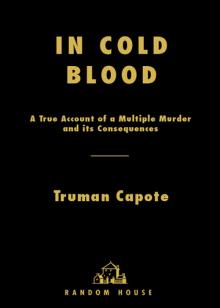 In Cold Blood
In Cold Blood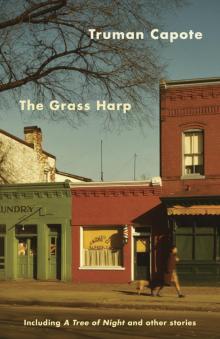 The Grass Harp, Including a Tree of Night and Other Stories
The Grass Harp, Including a Tree of Night and Other Stories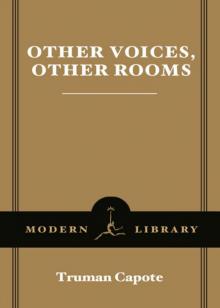 Other Voices, Other Rooms
Other Voices, Other Rooms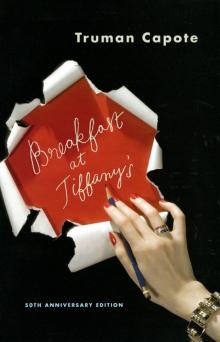 Breakfast at Tiffany's
Breakfast at Tiffany's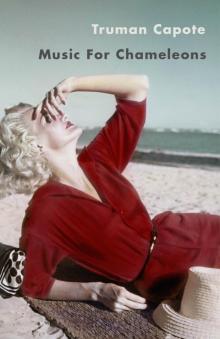 Music For Chameleons
Music For Chameleons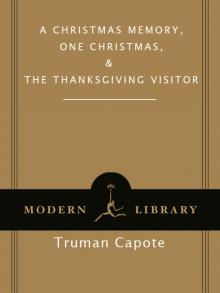 A Christmas Memory, Including One Christmas and the Thanksgiving Visitor
A Christmas Memory, Including One Christmas and the Thanksgiving Visitor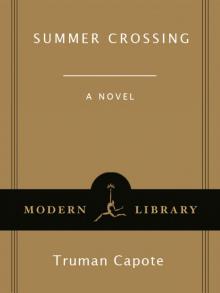 Summer Crossing
Summer Crossing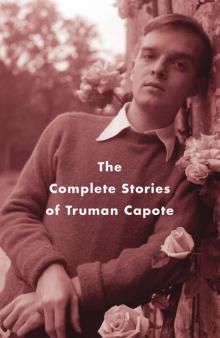 The Complete Stories of Truman Capote
The Complete Stories of Truman Capote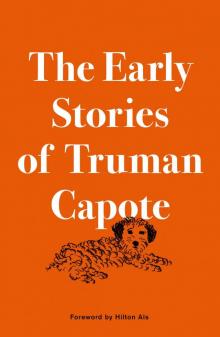 The Early Stories of Truman Capote
The Early Stories of Truman Capote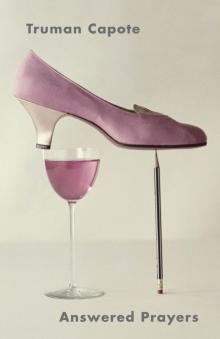 Answered Prayers
Answered Prayers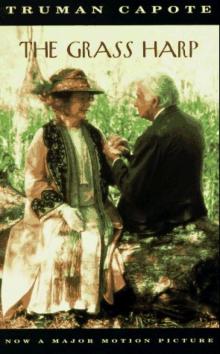 The Grass Harp
The Grass Harp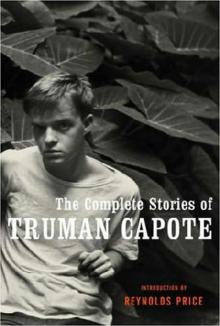 SSC (2004) The Complete Stories of Truman Capote
SSC (2004) The Complete Stories of Truman Capote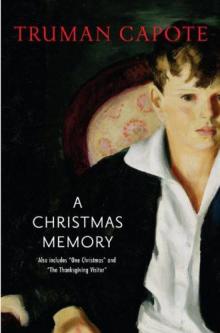 A Christmas Memory
A Christmas Memory